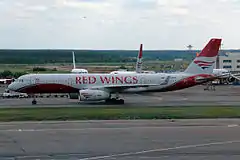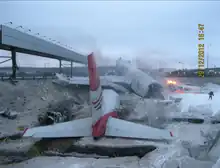Red Wings Airlines Flight 9268
Red Wings Airlines Flight 9268 (marketed as Red Airlines Flight 9268 under a codeshare agreement with Red Wings Airlines) was a Tupolev Tu-204-100 passenger jet that on 29 December 2012 crashed on landing at Moscow Vnukovo Airport, Russia, following a repositioning flight from Pardubice Airport, Czech Republic. There were no passengers on board, but 5 of the 8 crew members were killed when the aircraft hit a ditch and highway structures after overrunning the runway.[1]
 RA-64047, the aircraft involved in the accident | |
| Accident | |
|---|---|
| Date | 29 December 2012 |
| Summary | Runway overrun on landing due to braking system failure and pilot error |
| Site | Vnukovo International Airport, Moscow, Russia 55°35′2″N 37°15′18″E |
| Total injuries | 4 |
| Aircraft | |
| Aircraft type | Tupolev Tu-204-100B |
| Operator | Red Wings Airlines d/b/a Red Airlines |
| IATA flight No. | WZ9268 |
| ICAO flight No. | RWZ9268 |
| Call sign | REDWINGS 9268 |
| Registration | RA-64047 |
| Flight origin | Pardubice Airport, Pardubice, Czech Republic |
| Destination | Vnukovo International Airport, Moscow, Russia |
| Occupants | 8 |
| Passengers | 0 |
| Crew | 8 |
| Fatalities | 5 |
| Injuries | 3 |
| Survivors | 3 |
| Ground casualties | |
| Ground injuries | 1 |
The accident marked the second hull-loss of a Tupolev Tu-204, as well as the type's first fatal accident since its introduction in 1989.[2]
Background
According to Vnukovo airport authorities, there were eight crew members onboard and no passengers.[3]
It had been snowing prior to the accident and there was a significant cross wind with gusts of up to 29 knots (54 km/h; 33 mph).[2]
The 29 December accident was the second runway overrun involving a Red Wings operated Tu-204-100B in nine days. A Moscow Vnukovo to Novosibirsk flight on 20 December 2012 (operated by a Tupolev Tu-204 registered as RA-64049) overran runway 25 at Tolmachevo Airport by 350 metres (1,150 ft) when its brakes failed on landing. All 70 people on board survived uninjured and damage to the aircraft was minor. As a result of that incident, on 24 December the Federal Air Transport Agency of Russia (Rosaviatsia) issued a mandatory Airworthiness Directive requiring Red Wings and all other operators of the Tu-204 to inspect and apply extra lubrication to the braking system drive mechanism limit switches, located on the main landing shock absorber, "before next departure".
On 28 December, the day before the fatal Vnukovo accident, Rosaviatsia also formally notified Tupolev, the aircraft's manufacturer, that malfunctioning brakes had caused the Red Wings Tu-204 overrun accident at Novosibirsk.[4][5] On 30 December Rosaviatsia chief Alexander Neradko announced that a preliminary examination of the aircraft's flight data recorder indicated that the flight had touched down in the proper landing area but, as in the 20 December incident in Novosibirsk, the braking system on RA-64047 appeared to have failed in the fatal Moscow overrun accident as well.[6]
Aircraft and crew
The aircraft, a Tupolev Tu-204-100B (reg RA-64047, c/n 1450743164047, s/n 047) was built in 2008.[7] The airframe had accumulated 8,672 flight hours in 2,482 cycles, while the captain, 58-year-old Gennady Dmitrievich Shmelev, had more than 14,500 hours of total flying experience, of which more than 3,000 hours were on the Tu-204.[8]: 12–17 [9][10] The first officer, 52-year-old Evgeny Ivanovich Astashenkov had more than 10,000 flight hours, including more than 500 hours on the Tu-204.[8]: 17–19 The flight engineer, 54-year-old Igor Nikolaevich Fisenko, also had more than 10,000 flight hours, with nearly 1,600 of them on the Tu-204.[8]: 20–22 The accident was the first hull loss for Red Wings Airlines since its founding in 1999.[2]
Accident
| External video | |
|---|---|
The approach was carried out on runway 19 at Vnukovo Airport, which was 3,060 metres (10,039 ft) long. The captain was in control of the aircraft during approach.
The approach was performed without significant deviations from the glide path, and the aircraft passed over the start of the runway at a height of 15 metres (49 ft) and an airspeed of 260 kilometres per hour (140 kn; 160 mph). Five seconds after the throttle had been retarded to idle, the aircraft touched down, between 900 and 1,000 metres (2,953 and 3,281 ft) along the runway, at a speed of 230 kilometres per hour (120 kn; 140 mph). At the moment of touchdown only the left side gear was in contact with the runway. During the landing the right side wind gusts reached up to 11.5 metres per second (22.4 kn; 41 km/h; 26 mph). About 10 seconds have passed from the moment of passing the 4-metre (13 ft) altitude point and the touchdown. Three seconds after touchdown nose gear strut was compressed. At this stage the right gear strut compression signal had not yet been sensed. Almost simultaneously with the touchdown of the nose landing gear, the crew put the engines into reverse and applied the mechanical brakes.[11]

As a safety feature, both sets of main landing gear were required to be compressed simultaneously before the thrust reversers could deploy. Because there was no compression of the right landing gear, the reversers were never deployed, and moving the controls to the Maximum Reverse position caused an increase of forward thrust in both engines. In addition to the lack of reverse thrust, the airbrakes and spoilers failed to activate automatically, and the crew did not attempt to activate them manually. The minimum airspeed which the aircraft reached, 7–8 seconds after landing, was 200 to 205 kilometres per hour (108 to 111 kn; 124 to 127 mph), after which the speed began to increase to a maximum of 240 kilometres per hour (130 kn; 150 mph). The increased speed, along with rolling of the aircraft from side to side, alternately compressed the left and right landing gear struts. The crew attempted to activate the reversers a second time, but because there was no time when both landing gear struts were compressed, the attempt was unsuccessful. The wheel brakes were also ineffective, as they also required compression of the gear strut to function correctly.[2]
The aircraft skidded off the runway 32 seconds after landing at an air speed of about 215 kilometres per hour (116 kn; 134 mph). In the process of skidding off, at the command of the captain, the flight engineer switched off the engines by means of the emergency shut down. The plane continued to roll out of the runway, slowly decelerating due to road bumps and snow cover. At this point, both landing gear struts were compressed, which led to the activation of airbrakes and spoilers. The plane collided with the slope of a ravine at a ground speed of about 190 kilometres per hour (100 kn; 120 mph).[11]

There were five fatalities.[12] At 16:35 local time (12:35 GMT), the aircraft overran runway 19, splitting into three sections upon running into a ditch between the airport fence and the M3 highway, with parts of it scattering onto the road; included were parts of the aircraft's interior, seat assemblies and two of the aircraft's wheels hitting the underside of the runway's approach lighting system scaffolding and impacting an automobile. The crash was recorded on video by a dashcam mounted on another automobile.[13] The cockpit section of the aircraft became detached from the rest of the airframe.[14]
According to the official report, the cockpit crew consisting of the pilot, first officer, and flight engineer, were killed on impact. One of the flight attendants was ejected from the aircraft and landed on an adjacent road; she was confirmed to be dead in an ambulance transporting her to the hospital. Three of the remaining flight attendants, including the chief flight attendant, managed to escape the plane through cracks in the fuselage, and were transported to the hospital in serious condition. The remaining flight attendant was pulled out of the wreckage by first responders and transported to the hospital, where she later succumbed to her injuries.[2][8]
See also
References
- Hradecky, Simon (29 December 2012). "Accident: Red Wings T204 at Moscow on Dec 29th 2012, overran runway on landing". The Aviation Herald. Retrieved 22 January 2019.
- Ranter, Harro. "Accident description". aviation-safety.net. Aviation Safety Network. Retrieved 29 December 2012.
- Yahoo UK&Ireland News/AFP "Four dead as Russian plane crashes into motorway" Archived 2 January 2013 at the Wayback Machine. Retrieved 17:28(GMT) 29-12-2012
- Hradecky, Simon "Incident: Red Wings T204 at Novosibirsk on Dec 20th 2012, runway excursion on landing" The Aviation Herald 20 December 2012 (updated 30 December 2012)
- Ranter, Harro (20 December 2012). "ASN Aircraft accident 20-DEC-2012 Tupolev Tu-204-100V RA-64049". aviation-safety.net. Aviation Safety Network. Retrieved 29 December 2012.
- Zaks, Dimitri "Bad brakes blamed in Moscow crash landing" Agence France Presse, 30 December 2012.
- "Aircraft RA-64047, 2008 Tupolev Tu-204-100B C/N 1450743164047". Airport-data.com. Retrieved 30 December 2012.
- "IAC Final report" (PDF). Interstate Aviation Committee. Retrieved 7 April 2020.
- Hradacky, Simon "Accident: Red Wings T204 at Moscow on Dec 29th 2012, overran runway on landing" The Aviation Herald, 30 December 2012
- "Выжившая стюардесса рассказала подробности авиакатастрофы Ту-204" [Surviving stewardess told details of the Tu-204 plane crash]. Novye Izvestia (in Russian). 30 December 2012. Retrieved 7 April 2020.
- "IAC Interim report". Interstate Aviation Committee News
- "Russian plane crashes into road outside Moscow". BBC News, retrieved 17:22 (GMT), 2012-12-29
- Dashcam video showing crash from vehicle on road.
- "Russian passenger jet crashes at Moscow's Vnukovo airport". The Guardian. Agencies. 29 December 2012. Retrieved 30 December 2012.
Further reading
- Kaminski-Morrow, David. "Pilots killed as Red Wings Tu-204 crashes on Moscow highway." Flight International. 29 December 2012.
- Kaminski-Morrow, David. "Crashed Tu-204 powered forward as pilots tried reversing thrust." Flight International. 24 January 2013.
External links
- Ту-204 RA-64047 29.12.2012 - Interstate Aviation Committee (Official investigation) (in Russian) (Archive)
- Final report (Archive) (in Russian)
- EMERCOM of Russia
- "In accordance with an order of Emergency Ministry's Head Vladimir Puchkov all necessary emergency response and recovery operations are continued Archived 25 October 2014 at the Wayback Machine." 29 December 2012. Print Archived 25 October 2014 at the Wayback Machine, PDF Archived 25 October 2014 at the Wayback Machine, Word Archived 25 October 2014 at the Wayback Machine
- "Minister Vladimir Puchkov held an operational teleconference on the crash of Tu-204 airliner and gave instructions to all relevant services Archived 25 October 2014 at the Wayback Machine." 29 December 2012. Print Archived 25 October 2014 at the Wayback Machine, PDF Archived 25 October 2014 at the Wayback Machine. Word Archived 25 October 2014 at the Wayback Machine
- Red Wings Airlines (Archive, Archive 2) (in Russian)
- Airliners.net Flight 9268 preparing for departure in a photo by Karel Bohac, 29 December 2012
- Dashcam footage of the impact on YouTube